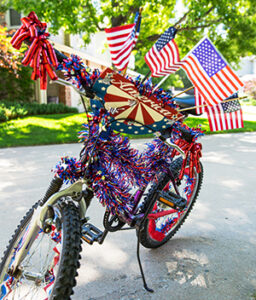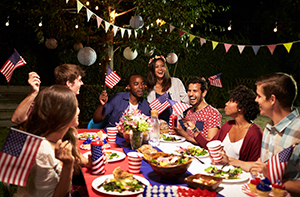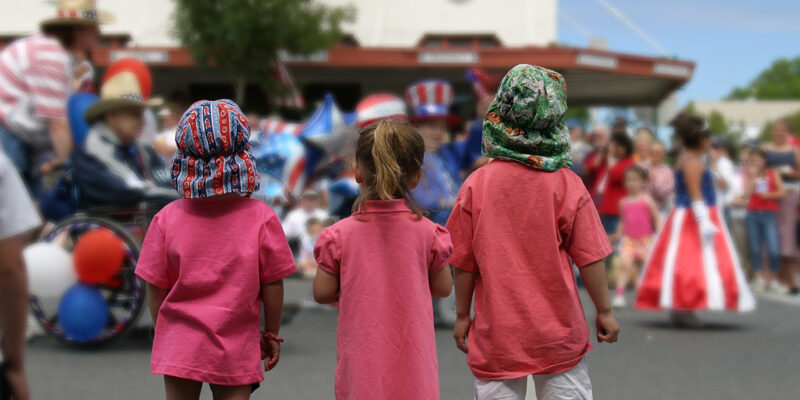A 4th of July parade is a great way to celebrate Independence Day in an HOA community, but planning one can be challenging. This guide will help associations and their residents organize a neighborhood-wide parade that everyone can enjoy.
The 4th of July Parade: A Classic Celebration
There are many events a homeowners association can cook up for Independence Day. From block parties and barbecues to pool parties and movie marathons, there’s something for everyone. One celebration that consistently makes a huge impression is the 4th of July parade.
Although parades happen city-wide (and even nationwide), there’s just something special about planning a small one for the community. It’s somehow more personal and allows residents to gain more familiarity with one another. There’s a sense of closeness when residents see their own neighbors marching down the street.
How to Plan a 4th of July Parade in an HOA
Parades are a staple of Independence Day celebrations, but associations often don’t know where to start when planning one. These steps will help communities organize their own successful 4th of July parade.
1. Get HOA Approval
Before diving straight in, it’s important to first come up with a proposal. If residents or the social events committee are the ones behind the wheel, they should seek approval from the board. On the other hand, if the board is the one planning the event, they can skip to ironing out the details.
The proposal should include all pertinent details of the parade. These include the route, the estimated budget, safety measures, and any additional support needed, such as security or volunteers. Getting all of this on paper will help keep everyone on the same page.
2. Set the Parade Details
Now, it’s time to decide the basics. The association should settle on the date and time of the parade, the parade route, and the theme. Typically, parades take place in the morning or early afternoon. This will allow the parade to take advantage of the natural light.
As for the route, it’s a good idea to map out wide roads within the community. Floats and wagons will typically join the parade, so it’s important to give these vehicles enough space to pass through. It’s also best to avoid any major intersections to ensure safety and avoid causing a traffic jam.
The HOA can get as creative as it likes with the theme. Just remember not to use a theme that anyone might deem offensive. Classic themes include patriotic ones like “Red, White, and Blue” and “Stars and Stripes.”
3. Notify Residents
The success of the whole operation relies on proper marketing. It’s essential to promote the event as early as possible. To achieve this, the association can post notices on bulletin boards, the community website, or social media platforms. Another option is to send emails or hand out printed flyers. Using all of these together will enable us to achieve better results.
Promotional materials should also include important information, such as the date, time, and theme. It’s also a good idea to include a map of the parade route so residents know which roads will be closed for the event. If the association is seeking volunteers or participants, these materials should outline the steps and requirements.
As the event approaches, the association should continue to promote it frequently. This will keep the event at the forefront of residents’ minds and ensure a higher turnout.
4. Coordinate Permits and Insurance
Ideally, the HOA would only use private roads or roads within the gated community. That said, if the 4th of July parade will utilize public roads, the association should check with their local or county offices for permit requirements. Additionally, board members should verify insurance coverage or liability concerns with the association’s provider.
5. Recruit Participants 
The HOA can’t have a parade without participants. There’s a variety of participants to invite, including but not limited to:
- Kids on decorated bikes
- Golf carts and strollers decked out in red, white, and blue
- Local marching bands or dance groups
- Pets in costume (if the route is short and safe)
Inclusivity is the name of the game. To ensure safety, make sure the pace remains slow and family-friendly.
6. Plan Logistics
Now, it’s time to finalize the logistics of the 4th of July parade. This includes setting up water stations along the route, placing trash and recycling bins at gathering spots, and preparing first aid kits. The association should also designate a point of contact for emergencies.
Additionally, the event will likely require volunteers to direct traffic, monitor safety, and assist with organization. If the HOA has a social events committee, its members may be enough to do all of this. Otherwise, it’s best to recruit volunteers and orient them thoroughly ahead of time.
7. Decorate the Route 
The route will feel more lively and in-theme if residents take the time to decorate their homes. Associations can even plan a decorating contest on the side to encourage residents to participate. Of course, decorations should remain purely optional. If there are spots along the route that feel bland or empty, consider using patriotic bunting and flags to add a touch of excitement.
8. Establish a Staging Area
To keep things organized, the association should choose a staging area where participants can stay before the parade. Here, participants can prepare, decorate, and line up. It’s also a good idea to assign start times if there are several categories in the parade.
9. End With a Gathering
As an optional bonus, consider capping the parade off with a mini party at the end of the route. Bring popsicles, lemonade, and snacks to keep everyone happy. The board can even hire a food truck to cater the event. Alternatively, the board can encourage residents to bring picnic baskets. Top it all off with games, music, and a brief program to thank everyone for attending.
10. Clean Up and Thank Everyone
While fun, the 4th of July parade would have likely made a mess, too. Ensure that volunteers are assigned to assist with the cleanup. Afterward, the board can send a post-event thank you email or a shoutout on social media. Share photos from the parade to allow everyone to relive the good memories.
An Unforgettable Event
Planning a 4th of July parade takes time, effort, and a budget, but it will all be worth it in the end. Associations can use this event to bring residents together, foster a sense of community, and build trust.
RELATED ARTICLES:
- 7 Festive Fourth Of July Cocktails You Can Easily Mix At Home
- Should Fireworks In An HOA Be Allowed or Banned?
- How To Prepare Your Home For Holiday Guests In HOA

